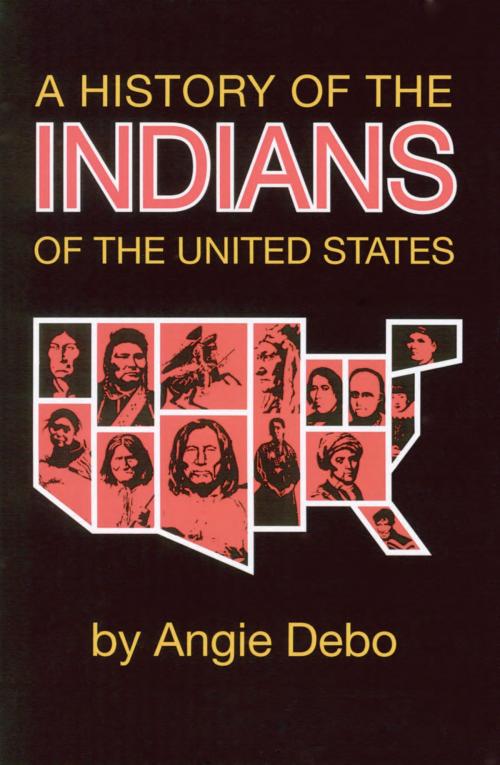A History of the Indians of the United States
Nonfiction, Social & Cultural Studies, Social Science, Cultural Studies, Native American Studies, History, Americas, Native American| Author: | Angie Debo | ISBN: | 9780806189659 |
| Publisher: | University of Oklahoma Press | Publication: | April 17, 2013 |
| Imprint: | University of Oklahoma Press | Language: | English |
| Author: | Angie Debo |
| ISBN: | 9780806189659 |
| Publisher: | University of Oklahoma Press |
| Publication: | April 17, 2013 |
| Imprint: | University of Oklahoma Press |
| Language: | English |
In 1906 when the Creek Indian Chitto Harjo was protesting the United States government's liquidation of his tribe's lands, he began his argument with an account of Indian history from the time of Columbus, "for, of course, a thing has to have a root before it can grow." Yet even today most intelligent non-Indian Americans have little knowledge of Indian history and affairs those lessons have not taken root.
This book is an in-depth historical survey of the Indians of the United States, including the Eskimos and Aleuts of Alaska, which isolates and analyzes the problems which have beset these people since their first contacts with Europeans. Only in the light of this knowledge, the author points out, can an intelligent Indian policy be formulated.
In the book are described the first meetings of Indians with explorers, the dispossession of the Indians by colonial expansion, their involvement in imperial rivalries, their beginning relations with the new American republic, and the ensuing century of war and encroachment.
The most recent aspects of government Indian policy are also detailed the good and bad administrative practices and measures to which the Indians have been subjected and their present situation.
Miss Debo's style is objective, and throughout the book the distinct social environment of the Indians is emphasized—an environment that is foreign to the experience of most white men. Through ignorance of that culture and life style the results of non-Indian policy toward Indians have been centuries of blundering and tragedy.
In response to Indian history, an enlightened policy must be formulated: protection of Indian land, vocational and educational training, voluntary relocation, encouragement of tribal organization, recognition of Indians' social groupings, and reliance on Indians' abilities to direct their own lives.
The result of this new policy would be a chance for Indians to live now, whether on their own land or as adjusted members of white society. Indian history is usually highly specialized and is never recorded in books of general history. This book unifies the many specialized volumes which have been written about their history and culture. It has been written not only for persons who work with Indians or for students of Indian culture, but for all Americans of good will.
In 1906 when the Creek Indian Chitto Harjo was protesting the United States government's liquidation of his tribe's lands, he began his argument with an account of Indian history from the time of Columbus, "for, of course, a thing has to have a root before it can grow." Yet even today most intelligent non-Indian Americans have little knowledge of Indian history and affairs those lessons have not taken root.
This book is an in-depth historical survey of the Indians of the United States, including the Eskimos and Aleuts of Alaska, which isolates and analyzes the problems which have beset these people since their first contacts with Europeans. Only in the light of this knowledge, the author points out, can an intelligent Indian policy be formulated.
In the book are described the first meetings of Indians with explorers, the dispossession of the Indians by colonial expansion, their involvement in imperial rivalries, their beginning relations with the new American republic, and the ensuing century of war and encroachment.
The most recent aspects of government Indian policy are also detailed the good and bad administrative practices and measures to which the Indians have been subjected and their present situation.
Miss Debo's style is objective, and throughout the book the distinct social environment of the Indians is emphasized—an environment that is foreign to the experience of most white men. Through ignorance of that culture and life style the results of non-Indian policy toward Indians have been centuries of blundering and tragedy.
In response to Indian history, an enlightened policy must be formulated: protection of Indian land, vocational and educational training, voluntary relocation, encouragement of tribal organization, recognition of Indians' social groupings, and reliance on Indians' abilities to direct their own lives.
The result of this new policy would be a chance for Indians to live now, whether on their own land or as adjusted members of white society. Indian history is usually highly specialized and is never recorded in books of general history. This book unifies the many specialized volumes which have been written about their history and culture. It has been written not only for persons who work with Indians or for students of Indian culture, but for all Americans of good will.















